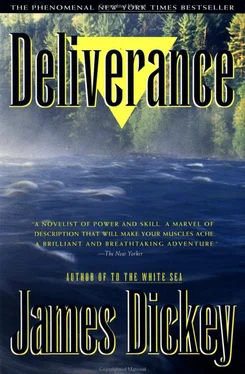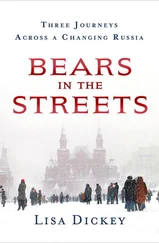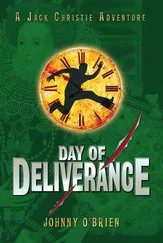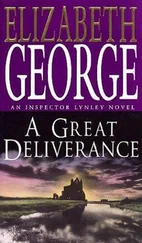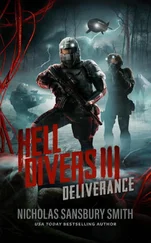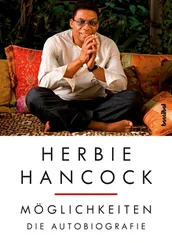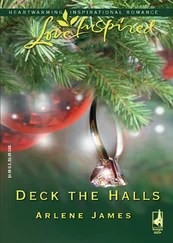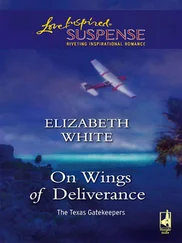The young doctor, sandy haired and pale, crouched beside me.
“No, no,” I said. “It’s not me. I can wait. Go back across the bridge. There’s a man in a canoe who’s got a bad fracture. It may have hemorrhaged in some way. Let’s get him looked after first.”
We drove down the highway—a land-motion of machines, and peculiar—to the bridge, and I got out one more time. I probably didn’t have to, but I thought it would be best.
Lewis was still in the canoe, stretched out and sweating, his shirt half-dark and his arm over his eyes, and Bobby was talking to the man and boy who had been fishing. I knew Bobby must have been testing his story out on them, and I hoped he had made good use of the time to get it straight; the others looked as though they believed him. It is hard to disbelieve injured, exhausted men, and that was a great advantage.
The driver and the doctor helped Lewis out of the canoe and onto the stretcher. The County Hospital was in Aintry, about seven miles off. We got ready to go, but while we were standing around the ambulance the highway patrol drove up, the siren droning faintly. A short fellow stepped out, and then a rough-looking blond boy. I got ready.
“What’s going on?” the blond officer said.
“We’ve had a bad accident,” I said, swaying a little more than I was actually swaying. I cut that out; acting might ruin the whole thing. “One of our party drowned in the river about ten miles upstream.”
He looked at me. “Drownded?”
“Yes,” I said. I believed I had got past the first of it, like the first of a bad set of rapids. But there was no way out except to keep on.
“How do you know he drownded?”
“Well, we capsized in the rapids, and it was just every man for himself. I don’t know what happened to him. He may have hit his head on a rock. But I don’t know. We just couldn’t find him, and I don’t see how he could not be drowned. I hope he’s not, but I’m afraid he is; he has to be.”
While I was talking I looked him in the eyes, which was surprisingly easy to do; they were sharp but sympathetic. As I went through some of the story that Bobby and I had rehearsed on the river, I made it a point to try to visualize the things I was saying as though they had really happened. I could see us searching for Drew, though we never had. I saw these things happen at the place near the yellow tree, and for me they were happening as I talked; it was hard to realize that they had not taken place in the actual world; as I saw him taking them into account, they became part of a world, the believed world, the world of recorded events, of history.
“Well,” he said, “We’ll have to drag the river. Can you show us ‘bout where it was?”
“I think so,” I said, not wanting to appear too sure, but fairly sure. “I don’t know if there’s a road in there, but I believe I’d know the place if I could get to it. We’ve got a hurt man, though. We’ve got to get him to a hospital.”
“OK,” he said, a little reluctant to have the situation pass from his jurisdiction to the doctor’s. “We’ll check in on you at the hospital later.”
“Fine,” I said, and crawled back into the ambulance beside Lewis.
We rode, and this kind of riding, though it wasn’t what I had got used to, was never better. The tires crunched at last and we stopped. I sat up, a little at a time. We were off in a field, and alongside us was a long flat building that looked like a rural high school. A warm wind was blowing over it. The doctor opened my vision wide, a door in each hand. “This is it, buddy,” he said. “Take it easy; we’ll get your friend out. Just go along with Cornelius.”
I took hold of the driver again, and we went through some glass doors, up a ramp, into a long hall that appeared to run out of sight, ending in a window the size of microfilm, way off and across.
“Second door to the right,” the driver said, and we went there. I sagged down on a white, tight table, the sheets straining under me. In a minute or two they brought Lewis, but didn’t bring him into the room. They put him on a table outside the door, and then noiselessly rolled him on, toward the faraway window. I lay and held my old friend, my side.
The doctor came back on soft feet. “Let’s see now, buddy,” he said. “Can you raise up just a little bit? Does this zipper still work?”
“I think so,” I mumbled. I tried to sit up, and made it easily, and even zipped the zipper down with my good hand. He took off my tennis shoes and I slithered out of the remains of the flying suit. My shorts were stuck into the wound like the nylon I had bound up in it, but he put something painless out of a bottle in the whole mass of cloth and flesh, and the shorts began to come away. He threw what I had been wearing into a corner, and started working on my side.
Things were dissolving there. Piece after piece of cloth, or of me, softened, softened, and came away, and he kept throwing them down below me, in the bare room. My side was breathing like a mouth, and it did not feel at all bad anymore, only stranger and more open.
“Good Lord, fellow,” he said. “What’s been chopping on you? Looks like somebody hit you in the side with an ax.”
“Does?”
Then more professionally, “How’d you do this?”
“We were trying to do a little illegal bowhunting up and down the banks of the river,” I said. “It’s not such a good thing to be doing, but we were doing it. We were going to miss the regular season, and we wanted to try it this way.”
“How in hell did you manage to shoot yourself with an arrow? I didn’t think it could be done.”
He was working and looking into my blood all the time, very busy and talking calmly.
I talked calmly. “I had the bow and arrows in the canoe with me when we dumped. I tried to hold on to the bow because I didn’t want to be in the woods without any weapon at all, and it sliced up my hands.” I held up the hand the arrows had sliced up, just as I said, “and the next thing I knew I had tangled with a rock and something was going through my side and the bow was gone. I don’t have any idea where it went. Downriver; that’s all I know.”
“Well, it made a good clean cut,” he said, “that got ragged. Part of it is real clean, and part of it is hacked up and looks sawed. You’ve got some kind of foreign matter in here, that I’m going to have to get out.”
“There was some camouflage paint on the arrows,” I said. “That’s what it is. But there might be something else in there, too. God knows what’s in there.”
“We’ll get it out,” he said. “Then we’ll sew you up like a quilt. You want a shot?”
“Yeah,” I said. “Scotch.”
“You can have another kind, before you get the Scotch,” he said. “You might have to wait awhile for the Scotch; this is a dry county.”
“You mean you don’t have any moonshine in this here hospital? And you way off in the country like this? What the hell is north Georgia coming to?”
“No white lightning,” he said. “We advise against it. Contains lead salts, most of it.”
He gave me a shot in the hip, and started working again. I looked out the window at the closing green of the day. There was nothing to see but the changes of green.
“You want to stay here with us tonight? There’s plenty of room. We’ve got a whole hospital. And you’ll never get another chance like this one; I can tell you. It’s peaceful here. No shotgunned farmers. Nobody who tangled with a tractor. Nobody on glucose from a drunk smashup. Nobody but you and your buddy, and a little boy, a snakebite case. And he’ll be gone tomorrow. Copperhead poison is not such hot poison.”
“No thanks,” I said, though I would have stayed with Lewis if I thought there was any use in it. “Get me sewed up and tell me where there’s a rooming house I can stay in. I’d like to call my wife, and I’d like to be by myself. I wouldn’t like sleeping in a ward, if I can help it, or in a hospital room if I don’t absolutely have to.”
Читать дальше
